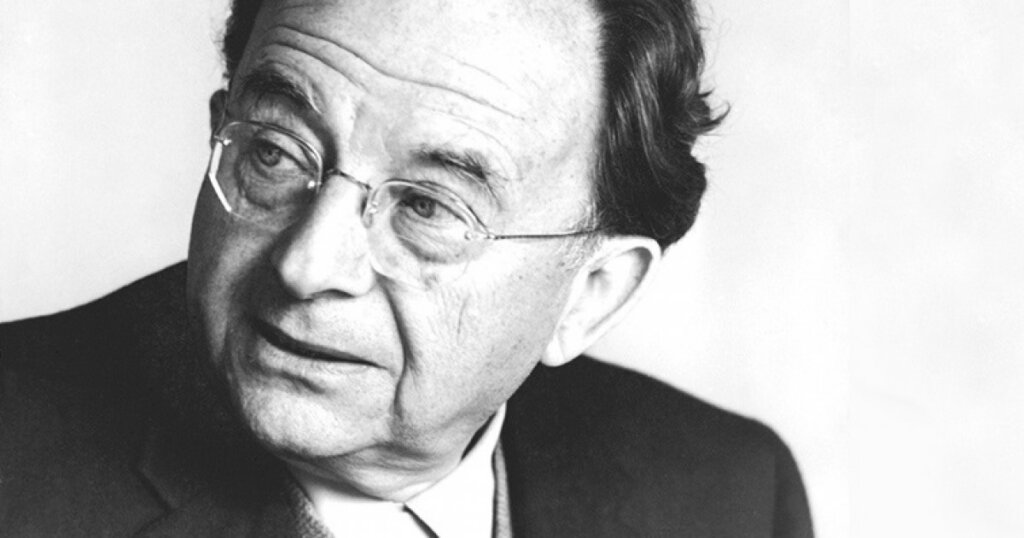The Dehumanized Society According to Erich Fromm


Written and verified by the psychologist Valeria Sabater
Erich Fromm defined the dehumanized society. This concept outlines a reflection that’s particularly familiar to us today. In fact, the famous psychoanalyst, philosopher, and social psychologist claimed that the world would progressively move towards a scenario with less social interaction and greater isolation. Furthermore, he stated that in the ‘megamachine’, as he defined industrialized society, man would be the slave of technology.
Fromm’s definition was more like a prediction. As a matter of fact, it was an almost exact vision of our current reality. In 1968, his book, The Revolution of Hope, was published. In this, he wanted to reflect on society and the type of human beings that would be found in the year 2000. He speculated that, if nuclear wars didn’t destroy us sooner, the world would certainly be colder, more alienated, and less empathetic.
Fromm claimed that the arrival of the new millennium wouldn’t be the culmination of happiness, and even less of freedom. For this reason, and to bring hope back to a hopeless world, he suggested it was necessary to become aware of a series of dimensions. As a matter of fact, the proposals that Fromm left us are still relevant today.
“The danger of the past was that man became slaves. The danger of the future is that man may become robots.”
-Erich Fromm-

Keys to understanding dehumanized society
There are those who point out that Erich Fromm was one of those figures who didn’t receive enough attention or the recognition that he deserved. In fact, his colleagues from the Frankfurt School, such as Theodor Adorno and Max Horkheimer, are perhaps more recognized names within the fields of philosophy or sociology. However, now, it’s inevitable that we recognize the great intellectual impact he had on the American intellectual world. More profoundly, in the field of psychology.
Fromm was a great defender of freedom. In fact, he warned of the mechanisms against which we could become submissive. The kind of attitude that gave way to new authoritarian governments, as had happened in Germany during the Second World War. As a matter of fact, what Fromm did, above all, was to teach us to understand Nazism from a socio-economic and psychological point of view.
The Revolution of Hope had a prophetic message. Indeed, in this book, he wanted to alert us to what the human being of 2000 would be like. He claimed they would be mere consumers, passive beings subjected to a mechanized reality that separates one individual from one another.
The dehumanized society as identified by Erich Fromm is, in many ways, a portrait of our world today.
“The sick individual finds himself at home with all other similarly sick individuals. The whole culture is geared to this kind of pathology.”
-Erich Fromm-
The human being will be just one more machine
Erich Fromm watched with some concern the advance of industrialized societies, such as the United States. Indeed, while it’s true that progress brings comfort, there’s no doubt, that apparent well-being has a cost, a dark side.
The business elite, and even the entrepreneurs themselves, are mere appendages of the machines that move the world. We’re slaves of technology. The megamachine is, for Fromm, a totally organized and homogenized social system in which machines and people are the same things. The only difference is that the human being loses freedom, health, and happiness for these machines to work.
We take it for granted that our computers and other technologies are at our service. However, in reality, it’s the other way around. There’s another interesting aspect that Fromm pointed out in his book. It’s the idea that men and women will lose faith and trust in human values, and instead, they’ll only recognize technical and material values.
The dehumanized society, according to Erich Fromm, will be an unhappy society.
Faced with a bleak outlook, there are two options
Erich Fromm wanted to prevent his predictions from happening in reality. He suggested that humanity has two options. The first is to get carried away by a mechanized society in which the individual will be a mere cog. The second way is that, if we want to progress as a society, we must be careful to make technology serve our own well-being and not the other way around.
This German philosopher of Jewish origin knew that it costs us a lot to invest in our own growth and advancement. That we often fall into apathy and inertia. In fact, we don’t commit ourselves to changes, but, in many cases, we’re mere slaves of our own passivity and complacency.
Human beings are becoming apathetic as they depend more and more on machinery than on their own ability to reason and to start revolutions.

Is it already too late?
“If people do not realize the direction in which they are going, they will wake up when it is too late and their fate has been irrevocably sealed,” Fromm pointed out in his book. His theory of dehumanized society had a prophetic connotation akin to the predictions of George Orwell.
However, the next question is: are we in time to avoid or prevent humanity from being subordinated to the technological universe? Something that Fromm himself points out is that consumerism isn’t the path to happiness and that true progress and freedom are initiated by the movers and the shakers. We’re already a little late for his particular revolution, but we should certainly bear his thoughts in mind.
All cited sources were thoroughly reviewed by our team to ensure their quality, reliability, currency, and validity. The bibliography of this article was considered reliable and of academic or scientific accuracy.
- Korstanje, Maximiliano E. (2009). Reseña de “El Miedo a la Libertad” de Erich Fromm. Nómadas. Revista Crítica de Ciencias Sociales y Jurídicas, 24 (4),. [Fecha de Consulta 21 de Noviembre de 2021]. ISSN: 1578-6730. Disponible en: https://www.redalyc.org/articulo.oa?id=18112178025
This text is provided for informational purposes only and does not replace consultation with a professional. If in doubt, consult your specialist.








